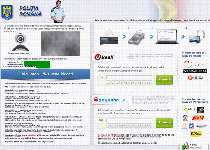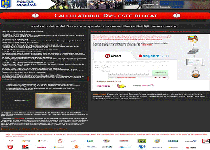Politia Romana Virus Ransomware
Posted: October 31, 2012
Threat Metric
The following fields listed on the Threat Meter containing a specific value, are explained in detail below:
Threat Level: The threat level scale goes from 1 to 10 where 10 is the highest level of severity and 1 is the lowest level of severity. Each specific level is relative to the threat's consistent assessed behaviors collected from SpyHunter's risk assessment model.
Detection Count: The collective number of confirmed and suspected cases of a particular malware threat. The detection count is calculated from infected PCs retrieved from diagnostic and scan log reports generated by SpyHunter.
Volume Count: Similar to the detection count, the Volume Count is specifically based on the number of confirmed and suspected threats infecting systems on a daily basis. High volume counts usually represent a popular threat but may or may not have infected a large number of systems. High detection count threats could lay dormant and have a low volume count. Criteria for Volume Count is relative to a daily detection count.
Trend Path: The Trend Path, utilizing an up arrow, down arrow or equal symbol, represents the level of recent movement of a particular threat. Up arrows represent an increase, down arrows represent a decline and the equal symbol represent no change to a threat's recent movement.
% Impact (Last 7 Days): This demonstrates a 7-day period change in the frequency of a malware threat infecting PCs. The percentage impact correlates directly to the current Trend Path to determine a rise or decline in the percentage.
| Ranking: | 19,275 |
|---|---|
| Threat Level: | 2/10 |
| Infected PCs: | 319 |
| First Seen: | October 31, 2012 |
|---|---|
| Last Seen: | January 18, 2025 |
| OS(es) Affected: | Windows |
 While fake police alerts are being displayed throughout the world, but with a particular emphasis on Europe, the Politia Romana Virus has made sure that Romania hasn't been left out of this wave of Reveton-based ransomware attacks. The immediate symptom of a Politia Romana Virus attack is a fake pop-up from Romania's 'cybercrime police department' that demands money in penance for your computer-based crimes. However, SpywareRemove.com malware analysts have also found other malicious functions associated with the Politia Romana Virus, including harmful browser modifications and program-blocking attacks. Ransomware Trojan threats and demands for money always should be ignored, and this goes just as much for the Politia Romana Virus, which has no right to your finances and should be removed by qualified anti-malware programs whenever the Politia Romana Virus is detected.
While fake police alerts are being displayed throughout the world, but with a particular emphasis on Europe, the Politia Romana Virus has made sure that Romania hasn't been left out of this wave of Reveton-based ransomware attacks. The immediate symptom of a Politia Romana Virus attack is a fake pop-up from Romania's 'cybercrime police department' that demands money in penance for your computer-based crimes. However, SpywareRemove.com malware analysts have also found other malicious functions associated with the Politia Romana Virus, including harmful browser modifications and program-blocking attacks. Ransomware Trojan threats and demands for money always should be ignored, and this goes just as much for the Politia Romana Virus, which has no right to your finances and should be removed by qualified anti-malware programs whenever the Politia Romana Virus is detected.
Politia Romana Virus: the Real Vampire that Sucks the Lifeblood from Your Bank Account
The Politia Romana Virus uses social engineering attacks to trick its victims into sending money to criminals via vouchers like Paysafecard and Ukash. These attacks show themselves in the form of borderless HTML pop-ups that claim to be from the Romanian police. Along with fake legal warnings about criminal actions associated with your computer, the Politia Romana Virus's pop-ups will show a webcam feed if any is available (to imply that you're being monitored visually), the Romanian coat of arms and various logos that are associated with retailers that sell vouchers.
The punchline to the Politia Romana Virus's fake police warning is its insistent that you pay out Euros via Ukash or Paysafecard before other penalties are enacted. However, since the Politia Romana Virus is illegal and unaffiliated with any Romanian police department, SpywareRemove.com malware experts recommend that you keep your money to yourself.
Because a Politia Romana Virus may interfere with your computer in a variety of ways, SpywareRemove.com malware researchers also encourage you to attempt to use Safe Mode or a reboot from a clean USB device before trying to remove the Politia Romana Virus. Further details on the harm that Politia Romana Viruses can cause are provided below.
All the Trouble that Politia Romana Virus Can Get into While You're Protecting Your Assets
Besides the definitive fake police warnings associated with Politia Romana Virus, SpywareRemove.com malware experts also have connected the following functions to Politia Romana Virus attacks:
- Changes to your browser that degrade its security.
- Problems with launching other programs, especially basic Windows tools like Task Manager.
- The installation of malicious DLL files that can perform a variety of functions. Some payloads related to Politia Romana Viruses have been known to include spyware (information-stealing) features.
These attacks also are standard for other Reveton-derived ransomware Trojans such as the Slovenská Polícia VirusSlovenská Polícia Virus, the Polizei Control Department Virus, the Poliisi Tietoverkkorikos Tutkinnan Yksikkö Ransomware, the France Ministère de l'Intérieur Virus, the Türk Polisi Virus or Polizia Slovena Ransomware. Although the Politia Romana Virus is targeted at Romania, SpywareRemove.com malware researchers stress that similar attacks have been found to target specific countries throughout the world – especially Europe. Naturally, scans from competent anti-malware programs are the preferable way to remove a Politia Romana Virus without harming your computer.

Use SpyHunter to Detect and Remove PC Threats
If you are concerned that malware or PC threats similar to Politia Romana Virus Ransomware may have infected your computer, we recommend you start an in-depth system scan with SpyHunter. SpyHunter is an advanced malware protection and remediation application that offers subscribers a comprehensive method for protecting PCs from malware, in addition to providing one-on-one technical support service.
* See Free Trial offer below. EULA and Privacy/Cookie Policy.
Why can't I open any program including SpyHunter? You may have a malware file running in memory that kills any programs that you try to launch on your PC. Tip: Download SpyHunter from a clean computer, copy it to a USB thumb drive, DVD or CD, then install it on the infected PC and run SpyHunter's malware scanner.
Technical Details
Additional Information
| # | Message |
|---|---|
| 1 | All operations performed by the computer will fail. In case if you use the web camera all the photos and videos are saved for identification. ............................ Your computer is blocked! |
| 2 | Toate operatiunile efectuate prin intermediul computerului dat se inscriu. in caz daca folositi camera-web toate fotografiile si video se salveaza pentru identificare. ………………………. Calculatorul dvs. Este blocat! |
Leave a Reply
Please note that we are not able to assist with billing and support issues regarding SpyHunter or other products. If you're having issues with SpyHunter, please get in touch with SpyHunter customer support through your SpyHunter . If you have SpyHunter billing questions, we recommend you check the Billing FAQ. For general suggestions or feedback, contact us.